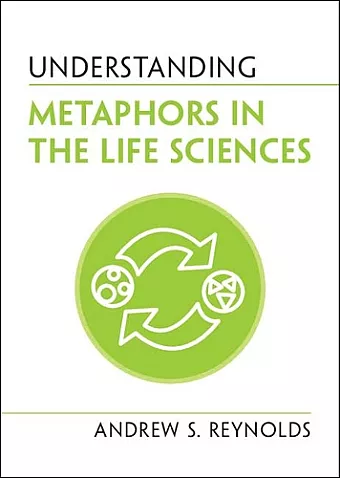Understanding Metaphors in the Life Sciences
Format:Paperback
Publisher:Cambridge University Press
Published:28th Apr '22
£11.99
Available to order, but very limited on stock - if we have issues obtaining a copy, we will let you know.
This paperback is available in another edition too:
- Hardback£34.99(9781108837286)

Introduces the diverse roles metaphors play in the life sciences and highlights their significance for theory, communication, and education.
Written for a general audience interested in how metaphorical language and thinking is used by life scientists to conceptualize and understand subjects from molecular genetics and cell biology to evolution, ecology, and biomedicine. It reveals the positive and negative implications of metaphors for scientific theory, communication, and education.Covering a range of metaphors from a diverse field of sciences, from cell and molecular biology to evolution, ecology, and biomedicine, Understanding Metaphors in the Life Sciences explores the positive and negative implications of the widespread use of metaphors in the biological and life sciences. From genetic codes, programs, and blueprints, to cell factories, survival of the fittest, the tree of life, selfish genes, and ecological niches, to genome editing with CRISPR's molecular scissors, metaphors are ubiquitous and vital components of the modern life sciences. But how exactly do metaphors help scientists to understand the objects they study? How can they mislead both scientists and laypeople alike? And what should we all understand about the implications of science's reliance on metaphorical speech and thought for objective knowledge and adequate public policy informed by science? This book will literally help you to better understand the metaphorical dimensions of science.
'What a timely book this is! It is precisely because biology has made such striking advances in recent years that its stock of metaphors is due for a clinical check-up. Reynolds offers a reliable and perceptive diagnosis of the framing narratives of the life sciences, sympathetically examining their strengths and weaknesses. This book should be an essential accompaniment to any study course in the biological sciences.' Philip Ball, science writer and author of How to Grow a Human
'In this beautifully written, highly accessible, and captivating work, Reynolds reveals the incredible extent to which scientific methods and descriptions in biology, the life sciences, and medicine are infused with metaphors. Interweaving the rich history and philosophy of the uses of these metaphors over time, their many implications for scientific reasoning, understanding, and the ethical and political dimensions of science itself are perceptively explored, with wonderful clarity and across an encyclopedic range of examples. Metaphors afford telling insight, opening doors to further inquiry and closing others. Is your genome software? Are enzymes molecular machines? Does nature select some traits over others, thereby constructing the tree of life? The fascinating world of metaphors in science comes to life on every page.' Anjan Chakravartty, University of Miami, USA
'I read Lakoff and Johnson's book Metaphors We Live By in the 1980s, and it was eye opening. Andrew Reynolds' book, which should be called Metaphors Science Lives By, is equally eye opening. Metaphors shape the way we live in the world. In science, they shape the way we understand the world. This can have huge implications for our lives, for better or for worse. How does this process of understanding work, especially in the life sciences? This book deals with the essential role of metaphors in this process. Written in an admirably clear style, Reynolds makes us aware of the power of metaphor, but also its dangers and pitfalls. It is an essential read for everybody interested in understanding how science and science communication work with and through metaphors. Importantly, it also dispels some common misunderstandings about the role of metaphors in science.' Brigitte Nerlich, University of Nottingham, UK
'Understanding Metaphors in the Life Sciences takes us from genes to cells, and up to the vast evolutionary tree of life, showing how science depends overwhelmingly on metaphor for understanding, for advance, for communication. A very important book.' Michael Ruse, Florida State University, USA
'Philosophically illuminating and richly informative on genetics, evolution and ecology, it should be obligatory reading for students in both the humanities and the sciences.' Jane O'Grady, Literary Review
'Clear and concise, the book has an immense didactic value and will serve as a precious teaching aid in history and philosophy classes. However, despite being intended as an entry-level text, the book is more than a synthetic introduction to the subject. Beyond the analysis and evaluation of some of the most iconic metaphors in the life sciences, Reynolds provides a unique perspective on their function and use.' Bartlomiej Swiatczak, Metascience
'Philosophically illuminating and richly informative on genetics, evolution and ecology, it should be obligatory reading for students in both the humanities and the sciences.' Jane O'Grady, Literary Review
'… Metaphors are ubiquitous in science, but especially so in biology, and the aim of the volume is to help us make sense of that … it offers a concise but comprehensive survey of the issue at hand. …The volume concludes with a nice succinct summary of common misunderstandings of the role of metaphors. To bring order to a rather sprawling literature, Reynolds introduces several helpful distinctions … Reynolds's treatment of the topic offers fine help to stay alert.' J. Arvid Ågren, The Quarterly Review of Biology
ISBN: 9781108940498
Dimensions: 177mm x 128mm x 10mm
Weight: 250g
150 pages